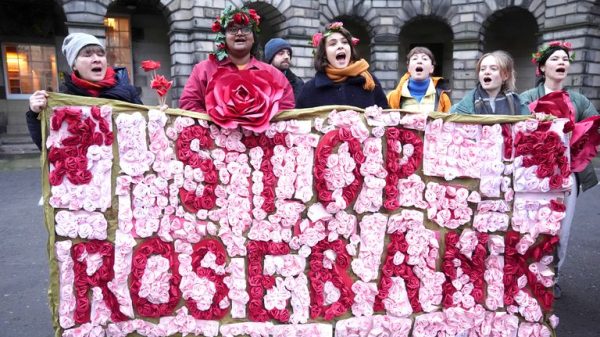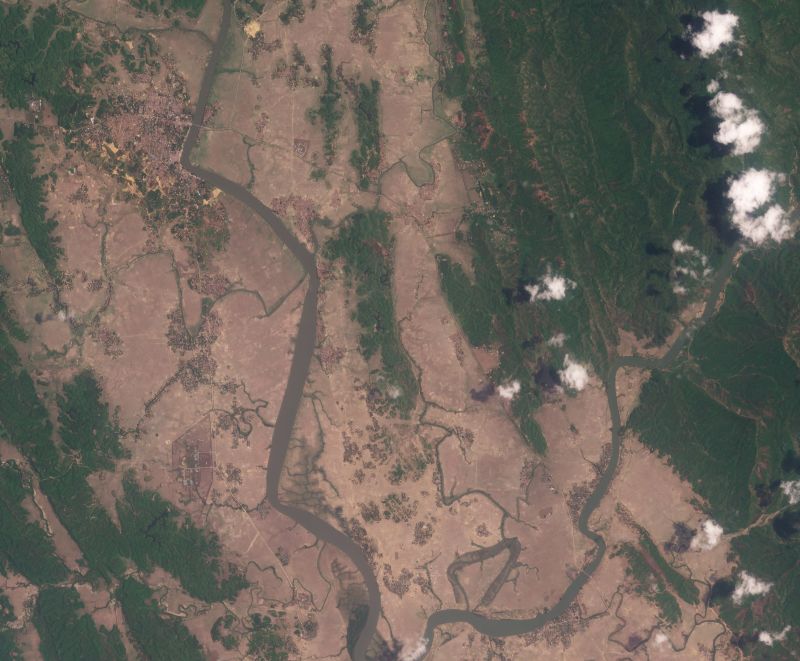Families of Rohingya people trapped in Myanmar’s west are desperately trying to contact loved ones after a weekend of widespread arson attacks displaced up to 200,000 people and caused extensive destruction of homes.
The country’s Rohingya have long suffered mass atrocities and forced displacement that many – including UN experts – consider to be genocide, perpetrated by the country’s military. Now, they are caught between warring forces in a deepening conflict that has unleashed more violence against the Muslim-majority community.
Since seizing power in a coup in February 2021, the military has been fighting a widening civil war against ethnic armed groups and people’s resistance forces across Myanmar.
In the western state of Rakhine, the Arakan Army, a powerful ethnic-minority armed group battling Myanmar’s military junta, said it seized a predominantly Rohingya town close to the Bangladesh border.
Reports from activists and relatives of residents have emerged of AA soldiers torching and looting Rohingya houses in the town of Buthidaung, preventing people from returning home, confiscating phones and threatening to kill those who try to contact family abroad.
A junta-imposed internet and telecoms blackout in the state is making it almost impossible for relatives to speak with family members there and for journalists, activists and international monitoring groups to verify exactly what is unfolding.
“Then, my brother-in-law told me that my family were displaced, and my home was burned down by the Arakan Army,” he said.
Rohingya rights activists and former officials said about 200,000 people had been forced to flee their homes to escape the fires and that many people, including women and children, had spent multiple nights hiding out in open paddy fields with no food, medicine, or belongings. There are also reports of an unconfirmed number of casualties.
“The entire town is burning,” said Nay San Lwin, a Rohingya activist originally from Buthidaung, and co-founder of the Free Rohingya Coalition. “Few houses remain intact, only a few.”
The violence echoes attacks on the stateless Rohingya community in 2016 and 2017, when Myanmar’s military launched a brutal campaign of killing, rape and arson that is currently subject to a genocide investigation at the International Court of Justice.
An estimated 1 million Rohingya people live now in what many consider to be the world’s largest refugee camp in Bangladesh, after hundreds of thousands fled the military’s “clearance operations.”
Many of those who remained in Myanmar live in apartheid-like conditions and face heavy restrictions on their movement, education and healthcare. More than 100,000 Rohingya people have been kept in squalid displacement camps by the military and government in the Rakhine state capital for the past 10 years. Others have made perilous boat journeys to Indonesia, choosing to risk their lives at sea over enduring inhumane conditions at home.
Young Rohingya men also face forcible conscription from the junta, the AA and armed Rohingya insurgent groups both in Myanmar and in the sprawling Bangladesh camps where gang violence is escalating.
Experts with the Special Advisory Council for Myanmar on Sunday warned that the Rohingya are “again at risk of genocide” and urged the UN Human Rights Council to convene a special session to address the “worsening human rights emergency in Myanmar.” UN rights chief Volker Türk said in a statement on Sunday that “this is a critical period when the risk of yet further atrocity crimes is particularly acute.”
Buthidaung attacks
Fighting between the Arakan Army and Myanmar’s military erupted in November after a shaky ceasefire broke down. The AA has made significant territorial gains in Rakhine state in recent months and last week announced that it had taken control of all junta military bases around Buthidaung, as well as the town itself.
Aung Kyaw Moe, a Rohingya adviser to Myanmar’s shadow National Unity Government – a continuation of the administration deposed in the coup – wrote on Saturday that the AA had ordered residents to leave the town in the days before the attack.
“Two days before AA call elders for meeting to leave the houses as soon as possible AA will confiscate the Buthidaung downtown,” he wrote on X, adding “the Rohingya said they will not leave because they have no where to go.”
In recent weeks, the population of Buthidaung had swelled as residents fled fighting in nearby villages, Rohingya activists said.
Nay San Lwin from the Free Rohingya Coalition – who managed to speak with several residents of Buthidaung – said that, at 9:30 p.m. local time on May 17, AA soldiers entered the town and shortly after began torching homes. Reports also suggested that junta airstrikes and artillery had hit Buthidaung that day but there were no military soldiers left in the town, he said.
“I asked them about who are conducting the burning – they strictly said the AA members came into town and started shooting into the air and warning people to get out of their houses or you will be burned alive,” he said.
John Quinley, director of human rights group Fortify Rights, said there is “clear destruction of civilian infrastructure including Rohingya civilian homes.”
“What we have in Buthidaung over the last few days is the junta conducting artillery shelling and airstrikes… and signs pointing to the AA conducting widespread arson over the weekend,” he said.
AA spokesperson Khaing Thu Kha wrote on Telegram Friday evening that the armed group was “evacuating the Muslim communities in Buthidaung and providing food, shelter, and medical care for them including the children, the women, and elderly persons.”
The AA has denied it torched the town, saying in a statement on May 20 that it “adheres to its principle of fighting under the military code of conduct and never targets non-military objects.”
It accused the Myanmar military, along with allied Rohingya militant groups – which it refers to as “Bengali terrorists” – of destroying Buthidaung.
The AA said that on May 17 the Myanmar military “launched a prolonged aerial attack on Buthidaung township until midnight as their last desperate attacks.”
A previous statement from the AA in late April said that homes of non-Muslim people living in Buthidaung had been burned down in attacks by “junta-backed Bengali Muslim terrorist groups” and “other Muslim militants recently armed and trained by the junta.”
Farooq, whose family were forced to flee the fires, said it was the AA who set fire to villages and the homes of the Rohingya. There was no active fighting with the military at the time, he said.
“In Buthidaung, when my (family) home and when my mom was asked to leave the village, there was no fight at all. There is no military left, no base, no junta there,” he said.
He said AA soldiers had warned residents there not to contact people living abroad and anyone caught with a Bangladesh SIM card “will be executed.”
Nay San Lwin also said he had heard reports that AA soldiers were taking cash and mobile phones from fleeing Rohingya.
“They are afraid they have footage (of them) torching these houses,” he said.
Humanitarian offices of Medecins Sans Frontières in the town were burned down on April 15, the group said. “We hear reports of more than 200 homes being burned down and witness thousands of people who are displaced by the violence seeking refuge in an area directly across from where our office was located,” it said at the time.
Warnings of further atrocities
An immediate concern is a humanitarian crisis in Rakhine state, with newly displaced residents unable to access food or clean water.
“There are no NGOs at all, who will distribute food for them? The Myanmar military has blocked all access,” said Nay San Lwin. “Also they are confining people to these villages. They are not allowed to leave.”
The violence has sparked a flurry of condemnations from human rights groups and the international community, calling for a halt in the fighting, to protect civilians, and for humanitarian aid to be allowed into Rakhine.
State Department spokesperson Matthew Miller said the US is “deeply troubled by the reports of increased violence” in Rakhine state and warned there are “risks of further atrocities occurring.”
“The military’s previous acts of genocide and other crimes against humanity targeting Rohingya, in addition to its history of stoking intercommunal tensions in Rakhine State and elsewhere across the country, underscore the grave dangers to civilians.”
Myanmar’s National Unity Government said on Tuesday that it has “repeatedly acknowledged that shameful past actions and failures in Myanmar allowed horrendous atrocities to be committed against minority communities, including the Rohingya, Rakhine and others in Rakhine state.”
“We are committed to ensuring that these crimes are never repeated.”



























